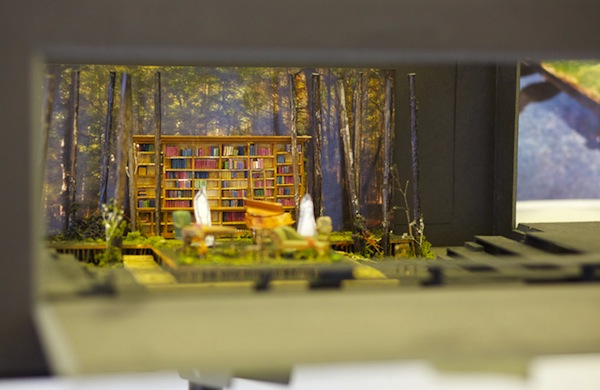 Lookingglass Theatre’s new play about Charles Darwin’s marriage to Emma Wedgwood takes place in the 1800s, but the script’s collision of love, science, and faith applies to today’s world, too.
Lookingglass Theatre’s new play about Charles Darwin’s marriage to Emma Wedgwood takes place in the 1800s, but the script’s collision of love, science, and faith applies to today’s world, too.
Like many playwrights, Sara Gmitter believes that theater should teach the audience something. The lessons she likes to impart are often influenced by her background as a Quaker and her time at
University for Peace in Costa Rica, where she earned a master’s degree from the United Nations–mandated institution.
Her new play,
In the Garden: A Darwinian Love Story, starts previews on Wednesday, April 16, at
Lookingglass Theatre, and, true to her own life experience, examines the collision of science and faith within the marriage of Charles Darwin and Emma Wedgwood, a devout Christian. But while the play focuses on two very specific—albeit real-life—characters in the 1800s, its lessons apply to modern living.
“It struck me that the conversations they were having, we’re still having,” Gmitter said. Here are five topics examined by the play that relate to the lives of today’s audiences.
1. Creationism vs. Evolution
Gmitter told us that at one point in the play, Emma explains her position to Charles: “It doesn’t matter how much proof you stack up. That’s not going to change people’s minds. What you’re talking about is that human beings are animals. That’s a really hard idea to let go of when we have all this proof around us that we’re better than animals.”
Right now, students in
public schools and private schools accepting tax-funded vouchers are taught alternatives to evolution. In Tennessee and Louisiana, for instance, biology classes teach that creationism is just as scientifically valid, fueling the ongoing debate.
2. Climate Change
Gmitter compared Charles’s methods of convincing skeptics to those of modern-day climate scientists. She argued that, like Charles, they approach their arguments by saying, “Look, I’ve laid out the facts, boom boom boom. I am done persuading.”
But when some people look outside and see a foot of snow on the ground, they have a hard time believing that the planet is warming. The recent polar vortex only stoked these feelings of doubt. Well-known political
commentators responded with fury, asking whether we expected them to trust their eyes or our “science.”
3. Proof vs. Faith
“You have a scientific mind, and the scientific way of being is to not believe anything until it’s proven,” Emma wrote in her real-life letters to Charles. “But how do you apply that scientific mind to things that can’t be proven? You might be cutting yourself off from this whole avenue of experience.”
Gmitter said she hopes her play will cause people to “think about where their belief comes from, whether it comes from proof or faith, and whether having it come from faith makes it any less true than whether it comes from proof.”
Even in science, theorists are taking ideas of
faith and proof and commingling them in the highest levels of thought. For example, experts on quantum theory frequently point out how an observer can change an experiment and that anything is possible—even walking through walls—given enough time.
4. Flame Wars
In the
legendary evolution debate between Samuel Wilberforce and biologist T.H. Huxley, the Bishop of Oxford asked Huxley, “Is it on your grandfather's or grandmother's side that you claim descent from the apes?” Huxley responded: “I would rather be descended from an ape than a bishop.”
Reading about this debate reminded Gmitter about “flame wars on the Internet and people looking to score points on the cleverness of what they’re saying rather than the ideas.” With In the Garden, she hopes Charles and Emma’s discussions inspire people to debate less combatively and “in a loving and open and generous way. … It can’t be shouting across a chasm.”
5. Tolerance for All Beliefs
In Dr. Seuss’s story “The Sneetches,” creatures with stars on their bellies shun those without such an insignia. But a “fix-it-up chappie” comes along who can help them remove or add stars for a fee. By the end of the story, no one can tell who is who and the Sneetches realize their prejudice was silly.
As a Quaker—almost but not quite a Sneetch—Gmitter has sometimes felt excluded by those who think all religious people are narrow-minded. She wants her audience members who feel strongly about faith and those who feel strongly about science to get the same message from the play: that their opinions are valuable and worthy of respect. “I don’t think those people can’t hang out together,” she said. “I believe that evolution is how we’ve got to where we are. [But] I’m also a spiritual person and have not exploded.”

In the Garden: A Darwinian Love Story
starts previews at Lookingglass Theatre (821 N. Michigan Ave., in the Water Tower Water Works building) on Wednesday, April 16, and runs through Sunday, June 15. Tickets are $25–$50 and can be purchased here.
Production photo courtesy of Lookingglass Theatre. Portrait by Tim Burkhart





 Lookingglass Theatre’s new play about Charles Darwin’s marriage to Emma Wedgwood takes place in the 1800s, but the script’s collision of love, science, and faith applies to today’s world, too.
Like many playwrights, Sara Gmitter believes that theater should teach the audience something. The lessons she likes to impart are often influenced by her background as a Quaker and her time at
Lookingglass Theatre’s new play about Charles Darwin’s marriage to Emma Wedgwood takes place in the 1800s, but the script’s collision of love, science, and faith applies to today’s world, too.
Like many playwrights, Sara Gmitter believes that theater should teach the audience something. The lessons she likes to impart are often influenced by her background as a Quaker and her time at  In the Garden: A Darwinian Love Story starts previews at Lookingglass Theatre (821 N. Michigan Ave., in the Water Tower Water Works building) on Wednesday, April 16, and runs through Sunday, June 15. Tickets are $25–$50 and can be purchased
In the Garden: A Darwinian Love Story starts previews at Lookingglass Theatre (821 N. Michigan Ave., in the Water Tower Water Works building) on Wednesday, April 16, and runs through Sunday, June 15. Tickets are $25–$50 and can be purchased 
